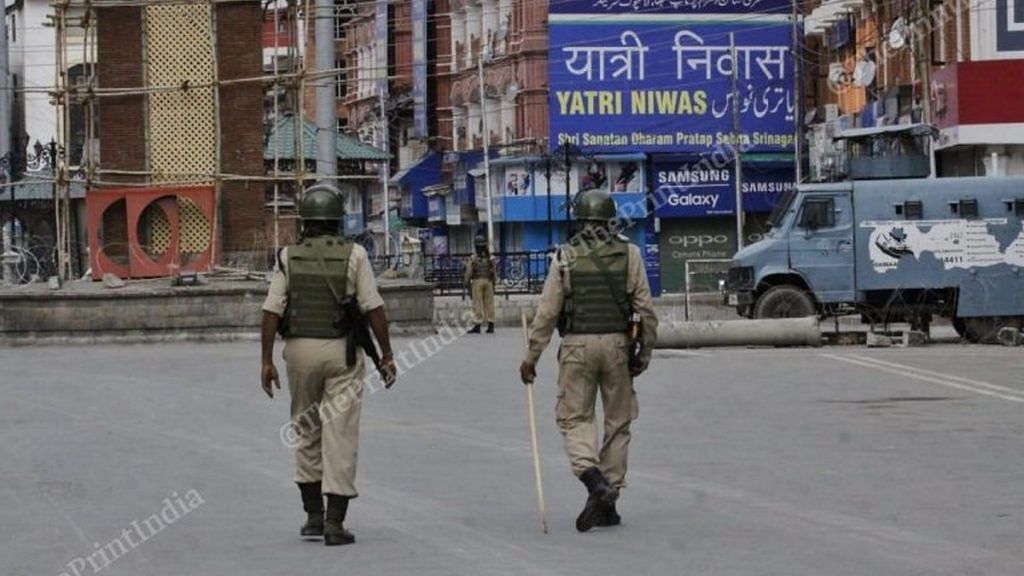Srinagar: Fresh changes introduced by the Modi government this week will allow Indians from across the country to apply for local government jobs in Jammu & Kashmir, including its police force.
The decision comes eight months after the government stripped Jammu & Kashmir of its special status, revoked its statehood and bifurcated it into two union territories.
The move has been widely criticised by mainstream political players of the Valley as “discriminatory” and an “insult”.
ThePrint explains what the new domicile rule is, and delves into its possible administrative implications.
Also Read: ‘New domicile rules an insult’ — J&K parties slam Modi govt move amid Covid-19 outbreak
Changing policy
Until last year, J&K enjoyed a special status under the constitutional provisions of Article 370 and 35A, which didn’t allow anyone from the rest of India to obtain domicile status there. This meant outsiders couldn’t apply for jobs in the local government (this rule didn’t apply to central government postings) or own property there.
However, both these provisions were scrapped on 5 August last year.
Earlier this week, the central government introduced a new definition of domicile in the union territory through the Jammu and Kashmir Reorganisation (Adaptation of State Laws) Order, 2020.
The new definition allows all Indian citizens to apply for government jobs in J&K if they fulfil certain conditions (listed later).
Through its Tuesday order, the Modi government also repealed 29 laws from the erstwhile state of J&K and amended 109 others that had not been struck down last August. The rest of the laws exclusive to J&K and its constitution ceased to exist when Article 370 was scrapped.
The immediate implication
The special status of the erstwhile undivided state of Jammu & Kashmir had its roots in laws made during Dogra ruler Maharaja Hari Singh’s regime.
The laws, notified in 1927 and 1932, defined citizenship, property rights, and privileges of state subjects. When Jammu & Kashmir acceded to India, these laws were preserved under Articles 370 and 35A of the Constitution, which restricted local property rights, government jobs and scholarships to permanent residents. Outlining the definition of a permanent resident was also the sole mandate of the state legislature.
The domicile rule makes all local government jobs available to non-natives, including those in police and administration, which means they will now be able to serve in such positions as station house officers and senior superintendents of police, besides secretaries, head of departments, deans and professors in state-owned universities.
As a result, the immediate implication of this change will most likely be reflected by the administrative set-up, which has so far been dominated by J&K natives.
Also Read: With Art 370, BJP hoped to win Kashmir but is now losing Jammu: ‘Are we also anti-national?’
Who can be domiciled or employed in J&K?
The new rule only reserves non-gazetted class four jobs for Jammu & Kashmir natives. It also lists certain conditions one should fulfil to qualify as a domicile applicant — applicants should have resided in J&K for 15 years, or studied in the state for seven years and appeared in either the Class 10 or the Class 12 examination there.
Children of central government officers (Army, paramilitary forces, IAS, IPS), and employees of public sector undertakings and banks, central universities etc who have served in Jammu & Kashmir for 10 years will also be eligible to apply for gazetted and non-gazetted government jobs. These included those who work outside the state.
Migrants registered by the Relief and Rehabilitation Commissioner need not fulfil the aforementioned requirements and will automatically be eligible for a domicile certificate.
The political road ahead
It remains to be seen how various political outfits of J&K will navigate themselves in the midst of the new political and administrative realities that have taken shape since last year.
Ahead of the Modi government’s 5 August decision, all mainstream political parties of Kashmir stated by way of the ‘Gupkar declaration’ that any tinkering with the special status of J&K would be considered an act of war against its people. In the immediate aftermath of the 5 August decision, dozens of politicians, including three former chief ministers — Farooq and Omar Abdullah of the National Conference, and Mehbooba Mufti of the Peoples Democratic Party — were detained by the administration, and political activity remained suspended for months together.
But many leading politicians, including Omar and Farooq, are now out, and the domicile rules drew immediate criticism from parties such as the Congress, the National Conference, the Peoples Democratic Party, the Peoples Conference, Peoples Movement, and the newest entrant, Apni Party, which has often been accused of being a central government proxy.
Even so, there isn’t much clarity on their plans now that Article 370 has been scrapped, and many questions remain unanswered. For example, will these parties accept the government’s 5 August decision and restrict their fight to protection of jobs and local land rights for now, as the Apni Party claims to be doing? Or will the restoration of special status be the peg of any political activity from here on?
Also Read: Modi govt amends J&K’s Public Safety Act, withdraws privileges given to former CMs
